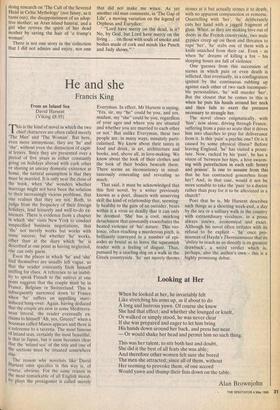He and she
Francis King
From an Inland Sea David Harsent (Viking £8.95) This is the kind of novel in which the two 1 chief characters are often called merely The Man' and 'The Woman'. But here, even more anonymous, they are 'he' and 'she', without even the distinction of capit- al letters. Since they are presented over a period of five years as either constantly going on holidays abroad with each other or sharing an uneasy domestic existence at home, the natural assumption is that they must be married. It is only near the close of the book, when 'she' wonders whether marriage might not have been the solution to their increasingly vicious problems, that one realises that they are not. Both, to judge from the frequency of their foreign holidays, lead leisurely and well-to-do ex- istences. There is evidence from a chapter in which 'she' visits New York to conduct unspecified business negotiations, that `she' not merely works but works with some success; but whether 'he' works, other than at the diary which 'he' is described at one point as having neglected, one can only guess.
Even the places in which 'he' and 'she' find themselves are usually left vague, so that the reader constantly finds himself sniffing for clues. A reference to an inabil- ity to speak French to the natives at one Point suggests that the couple must be in France, Belgium or Switzerland. This is subsequently narrowed down to France When 'he' suffers an appalling marc- induced hang-over. Again, having deduced that the couple are now in some Mediterra- nean littoral, the reader eventually ex- claims to himself `Ah, yes, Greece!' when a
boatman called Manos appears and there is a reference to a taverna. The most famous of inland seas, certainly the most beautiful, IS that in Japan, but it soon becomes clear that the 'inland sea' of the title and one of the sections must be situated somewhere else.
The reason why novelists like David Harsent omit specifics in this way is, of Course, obvious. For the same reason in the most remarkable of all English moral- ity plays the protagonist is called merely Everyman. In effect, Mr Harsent is saying, 'Yes, sir, my "he" could be you, and yes, madam, my "she" could be you, regardless of your ages and where you are situated and whether you are married to each other or not.' But unlike Everyman, these two people are, in many ways, minutely parti- cularised. We know about their tastes in food and drink, in art, architecture and books, and, above all, in love-making. We know about the look of their clothes and the look of their bodies beneath them. There seems an inconsistency in simul- taneously concealing and revealing so much.
That said, it must be acknowledged that this first novel, by a writer previously known as a poet, dissects with unnerving skill the kind of relationship that, seeming- ly healthy to the gaze of an outsider, bears within it a virus so deadly that it can only be doomed. 'She' has a cool, mocking detachment that constantly exacerbates the heated violence of 'his' nature. This vio- lence, often reaching a murderous pitch, is brilliantly conveyed in a number of epi- sodes so brutal as to leave the squeamish reader with a feeling of disgust. Thus, pursued by a snarling dog on a walk in the Greek countryside, `he' not merely throws stones at it but actually stones it to death, with no apparent compunction or remorse. Quarrelling with 'her', 'he' deliberately cuts her hand with a jagged fragment of glass. When, as they are making love out of doors in the French countryside, two male gypsies creep up on them and threaten to rape 'her', 'he' stabs one of them with a knife snatched from their car. Even — as when 'he' dreams of killing a fox — his sleeping hours are full of violence.
One 'guesses from this succession of scenes in which pain or even death is inflicted, that eventually, in a conflagration ignited by the continuous rubbing up against each other of two such incompati- ble personalities, 'he' will murder 'her'. But the closest that he comes to this is when he puts his hands around her neck and then fails to exert the pressure necessary to strangle her.
The novel closes enigmatically, with 'him', now alone, driving through France, suffering from a pain so acute that it drives him into churches to pray for deliverance from it. Is this 'pain' a psychic one? Or is it caused by some physical illness? Before leaving England, 'he' has visited a prosti- tute. Now, racked by his 'pain', he has a vision of 'between her hips, a hive swarm- ing with putrefaction in each cell: honey and poison'. Is one to assume from this that he has contracted gonorrhea from her? And, in that case, would it not be more sensible to take the 'pain' to a doctor rather than pray for it to be alleviated in a church?
Poet that he is, Mr Harsent describes such things as a shooting week-end, a day by the sea or a solitary walk in the country with extraordinary vividness, in a prose always sinewy, economical and exact. Although his novel often irritates with its refusal to be explicit — 'he' once pro- nounces of Haydn's Theresienmasse that its 'ability to reach us so directly is its greatest drawback', a weird verdict which is, perhaps, also the author's own — this is a highly promising debut.


















































 Previous page
Previous page